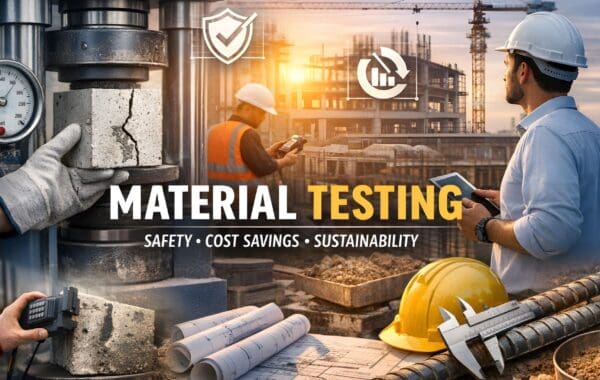
Role of Material Testing and Calibration in Modern Infrastructure

Ensuring Construction Quality and Durability: The Role of Material Testing and Calibration in Modern Infrastructure
Introduction: In the rapidly evolving field of construction and infrastructure, ensuring material integrity is paramount to building safe, durable structures. Material testing and calibration play an essential role in this process, helping construction professionals meet rigorous safety standards and deliver projects that stand the test of time. Companies like Global Lab specialize in providing these services, using advanced techniques to assess the properties of various materials, from cement and concrete to metals and composites. This article explores the crucial services Global Lab offers, such as Non-Destructive Testing (NDT), chemical testing of materials, and precise calibration services, which together form the backbone of quality assurance in modern construction.
1. Non-Destructive Testing (NDT): Evaluating Integrity Without Compromise
NDT is a cornerstone of quality assurance in construction, allowing for the assessment of materials’ properties without altering or damaging them. NDT methods, such as ultrasonic testing, radiographic testing, and magnetic particle testing, are highly effective for evaluating the structural integrity of materials like concrete, steel, and other load-bearing components. These tests are crucial for:
- Safety Assurance: By identifying hidden flaws or weaknesses, NDT helps prevent potential failures in structures, ensuring they can withstand stress over time.
- Cost Efficiency: NDT enables early detection of issues, reducing the likelihood of costly repairs or replacements.
- Environmental Impact: Since NDT is non-invasive, it avoids wastage associated with destructive testing methods, promoting a sustainable approach to quality control.
Global Lab’s NDT services ensure that construction companies meet both regulatory and client standards, providing comprehensive analysis reports that facilitate informed decision-making and project planning.
2. Chemical Testing of Materials: Understanding Composition for Performance
Chemical testing provides a deeper understanding of material composition and quality, offering valuable insights into how materials will perform under various conditions. For example, assessing the chemical composition of cement, aggregates, and admixtures is essential for producing durable concrete mixes. Chemical testing covers several aspects, such as:
- Contaminant Identification: Testing can reveal the presence of harmful contaminants like chlorides and sulfates in cement or water, which can weaken concrete and reduce its lifespan.
- Performance Analysis: Chemical analysis ensures that materials meet specified standards for construction applications, contributing to overall project quality.
- Material Suitability: By analyzing properties such as pH levels, chemical composition, and reactivity, these tests help determine if materials are appropriate for specific construction environments.
Global Lab’s chemical testing services for construction materials, including cement, fly ash, and GGBS (ground granulated blast-furnace slag), ensure each component meets high-performance standards, improving the durability and safety of the finished structure.
3. Calibration Services: Precision in Every Measurement
Accurate measurements are essential at every stage of a construction project, from planning to execution. Calibration services verify that measuring instruments are functioning accurately, ensuring the reliability of data collected on-site. Some of the most common instruments requiring calibration include pressure gauges, thermometers, and load cells. Calibration services provide:
- Enhanced Accuracy: Calibrated instruments ensure precise measurements, minimizing errors in material properties assessment.
- Compliance with Standards: Adhering to industry standards is crucial for passing inspections and meeting legal requirements.
- Increased Efficiency: Calibrated equipment reduces the risk of rework due to inaccuracies, saving both time and money.
Global Lab’s calibration services guarantee that measuring instruments provide exact data, helping construction teams avoid costly mistakes and ensuring their projects remain on track.
4. Practical Applications in the Construction Industry
Material testing and calibration have practical applications across diverse areas of construction, such as:
- Infrastructure Projects: Large projects like bridges, highways, and airports rely on high-quality materials and precise measurements to meet safety requirements and enhance longevity.
- High-Rise Buildings: Testing structural steel, concrete, and coupling materials ensures the stability and load-bearing capacity of skyscrapers.
- Residential and Commercial Buildings: NDT and chemical testing verify that essential building materials meet the required strength and durability for everyday use.
5. Conclusion: The Future of Quality Assurance in Construction
With ever-growing demands for safe and resilient structures, the importance of comprehensive material testing and calibration is only set to increase. Global Lab provides these essential services, helping construction companies guarantee the quality and performance of their materials while minimizing risks and maximizing efficiency. For those in the construction industry, partnering with a reliable material testing provider like Global Lab is not just a quality measure but a strategic advantage.

